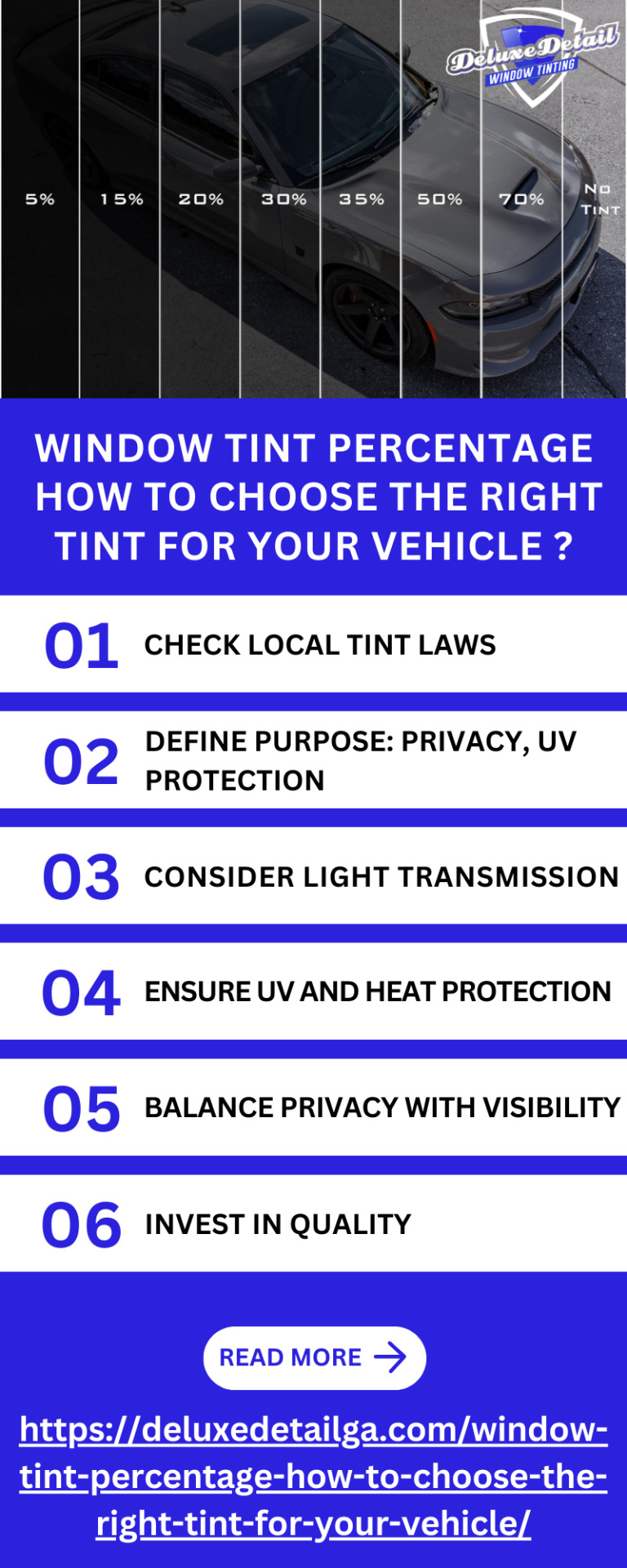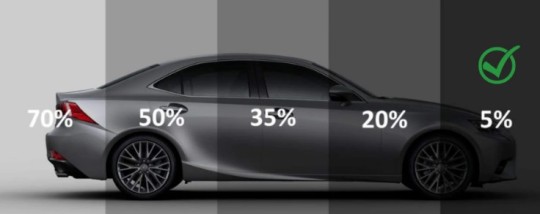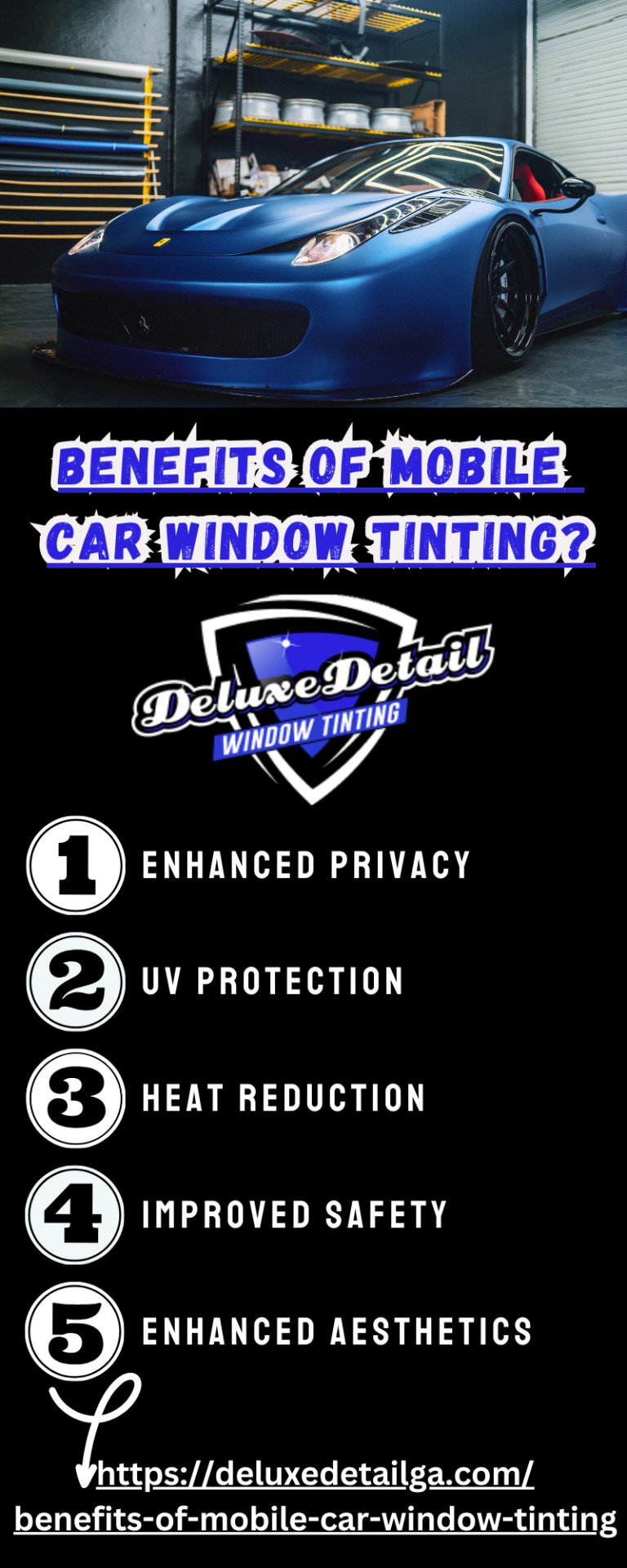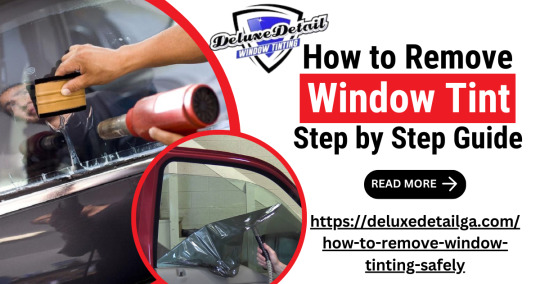Deluxe Detail Window Tinting specializes in top-quality and affordable window tint Covington, Ga. Our expertise lies in enhancing privacy, reducing glare, and protecting interiors from harmful UV rays through expert window tinting solutions. With a commitment to premium materials and skilled craftsmanship, we cater to both residential and commercial clients, ensuring a seamless experience and unmatched results. Whether it's safeguarding your car's interior or adding a layer of sophistication to your property, we deliver unparalleled service and lasting satisfaction, making us the go-to destination for exceptional window tinting Covington, Ga. -> -> ->https://deluxedetailga.com
Don't wanna be here? Send us removal request.
Text
Enhance Your Ride: A Comprehensive Guide to Choosing the Best Car Window Tint

Car window tinting isn't just about adding a sleek aesthetic to your vehicle; it also offers numerous practical benefits such as UV protection, heat reduction, privacy, and even safety. With an array of options available, selecting the best car window tint can be a daunting task. In this guide, we'll explore the key factors to consider and provide insights to help you make an informed decision.
Understand the Legal Regulations: Before diving into the world of car window tinting, it's crucial to familiarize yourself with the legal regulations in your area. Different states and countries have specific laws governing the darkness of tint that is permissible on vehicle windows. These regulations typically specify the Visible Light Transmission (VLT) percentage, which determines how much light can pass through the tint. Ignoring these laws can lead to fines and even the requirement to remove the tint, so it's essential to adhere to them.
Consider Your Priorities: Identify your primary reasons for tinting your car windows. Are you mainly concerned about reducing heat and glare? Do you prioritize privacy and security? Understanding your priorities will help you narrow down your options and choose the most suitable type of tint for your needs.
Evaluate Different Tint Types: There are various types of window tint films available, each offering unique features and benefits:
Dyed Film: Dyed tint is the most affordable option and is primarily designed to enhance the appearance of your vehicle. It absorbs heat and reduces glare, but its color may fade over time.
Metalized Film: Metalized tint contains metallic particles that reflect heat and UV rays, making it more effective at heat rejection than dyed film. It also provides added strength to the window glass, improving its shatter resistance.
Carbon Film: Carbon tint is known for its superior heat-rejection properties and durability. It does not contain metal, so it won't interfere with electronic signals like GPS or radio reception. Carbon tint also maintains its color and clarity for longer periods.
Ceramic Film: Considered the premium option, ceramic tint offers the highest level of heat rejection and UV protection. It is non-metallic, so it won't interfere with electronic devices, and it provides excellent clarity and color stability.
Assess Tint Darkness: The darkness of the tint is measured by its VLT percentage, which indicates the amount of visible light that can pass through the film. While darker tints offer greater privacy and heat rejection, they may also reduce visibility, especially at night. Strike a balance between aesthetics, functionality, and legal compliance when selecting the darkness level of your tint.
Choose a Professional Installation: Regardless of the type of tint you choose, proper installation is crucial for achieving optimal results. Entrust the installation to a reputable professional with experience in automotive window tinting. A skilled installer will ensure that the tint is applied evenly, without bubbles or creases, and complies with local regulations.
Conclusion:
Investing in high-quality car window tint can significantly enhance your driving experience by providing added comfort, privacy, and protection. By considering factors such as tint type, darkness level, and legal regulations, you can select the best tint for your vehicle's needs. Remember to prioritize quality and professional installation to enjoy the full benefits of your window tint for years to come.
0 notes
Text
Benefits of Home Window Tinting

Home window tinting offers a multitude of benefits, ranging from enhanced privacy and security to improved energy efficiency and UV protection. By reducing glare and blocking harmful UV rays, tinted windows create a more comfortable indoor environment, shielding furnishings and occupants from sun damage. Additionally, they can help regulate interior temperatures, reducing reliance on heating and cooling systems and ultimately lowering energy bills. Moreover, tinted windows enhance privacy by limiting visibility from the outside, adding a layer of security against prying eyes. Overall, investing in home window tinting not only improves the aesthetics and comfort of a living space but also contributes to long-term cost savings and environmental sustainability.
0 notes
Text
Enhancing Comfort and Efficiency: The Benefits of Residential Window Tin
In the pursuit of creating a comfortable and energy-efficient home environment, homeowners are increasingly turning to residential window tinting as a solution. The application of window tint not only enhances privacy but also offers numerous benefits in terms of energy efficiency, UV protection, and overall comfort. In this article, we will explore how residential window tint can significantly improve the quality of life within your home.
Understanding Residential Window Tint
Residential window tint is a thin, transparent film applied to the interior surface of windows. It is composed of layers of polyester film treated with special chemicals to provide various functionalities. While some window tints are designed primarily for aesthetic purposes, others are engineered to offer specific benefits such as heat rejection, UV protection, glare reduction, and privacy enhancement.
Energy Efficiency
One of the primary advantages of residential window tint is its ability to improve the energy efficiency of your home. By reducing the amount of solar heat entering through windows, tinted films help regulate indoor temperatures, thereby reducing the workload on heating and cooling systems. This can result in lower energy consumption and utility bills, especially in regions with hot summers or cold winters.
UV Protection
Exposure to ultraviolet (UV) radiation from the sun can cause various health issues, including skin damage, premature aging, and an increased risk of skin cancer. Residential window tint acts as a barrier against harmful UV rays, blocking up to 99% of the sun's UV radiation. This not only helps protect the health of occupants but also prevents fading and deterioration of interior furnishings, such as furniture, carpets, and artwork, which can be damaged by prolonged sun exposure.
Glare Reduction
Excessive glare from sunlight can create discomfort and interfere with activities such as reading, watching television, or working on a computer. Residential window tint reduces glare by diffusing sunlight as it passes through the windows, creating a more comfortable and visually pleasing indoor environment. This allows occupants to enjoy natural light without the discomfort and inconvenience caused by glare.
Privacy Enhancement
Privacy is another significant benefit of residential window tint. Tinted films can obscure the view into your home from the outside while still allowing you to see out clearly. This enhances privacy by preventing unwanted onlookers from peering into your living spaces, offering peace of mind and security for you and your family.
Conclusion
In conclusion, residential window tinting offers a range of benefits that can significantly enhance the comfort, efficiency, and privacy of your home. By reducing heat gain, blocking UV radiation, minimizing glare, and enhancing privacy, window tinting contributes to a more enjoyable and energy-efficient living environment. Whether you're looking to lower your energy bills, protect your furnishings, or simply create a more comfortable home, investing in residential window tint is a worthwhile consideration.
Incorporating residential window tint into your home improvement plans can provide long-term benefits that improve both your quality of life and the value of your property. With its proven effectiveness and versatility, window tinting has become an increasingly popular choice for homeowners seeking practical solutions to enhance their living spaces.
0 notes
Text
Benefits of Commercial Window Tint

Commercial window tinting offers a plethora of benefits for businesses across various industries. Firstly, it provides substantial energy savings by reducing heat gain during hot seasons and heat loss during colder months, thereby lowering the reliance on HVAC systems and decreasing utility bills. Additionally, commercial window tinting enhances occupant comfort by minimizing glare from the sun, which can lead to improved productivity and satisfaction among employees and customers alike. Moreover, it blocks harmful UV rays, protecting furnishings, merchandise, and occupants from fading and potential health risks associated with prolonged sun exposure. Furthermore, tinted windows offer increased privacy and security by obscuring the view into the building, deterring theft, and safeguarding sensitive information. In terms of aesthetics, window tinting can elevate the appearance of commercial properties, adding a sleek, modern look that enhances curb appeal and attracts clientele. Furthermore, it contributes to environmental sustainability efforts by reducing carbon emissions associated with excessive energy consumption. Overall, the myriad benefits of commercial window tint make it a wise investment for businesses seeking to improve energy efficiency, comfort, security, and aesthetics while reducing operational costs and environmental impact.
0 notes
Text
🌟✨ Upgrade Your Space with Automotive, Commercial, and Residential Window Tinting Services at Deluxe Detail Window Tinting! 🚗🏢🏡

Experience the ultimate in window tinting solutions with Deluxe Detail Window Tinting. Our expert team offers professional-grade tinting services for automotive, commercial, and residential spaces.
🚗 Automotive Window Tinting:
Enhance the style, comfort, and privacy of your vehicle with our premium automotive window tinting services.
🏢 Commercial Window Tinting:
Improve energy efficiency, reduce glare, and enhance privacy in your commercial space with our customized window tinting solutions.
🏡 Residential Window Tinting:
Enjoy increased comfort, energy savings, and privacy in your home with our high-quality residential window tinting services.
💼 Ready to Elevate Your Space? Schedule your appointment with Deluxe Detail Window Tinting today!
📞 Contact us now to learn more about our services and transform your automotive, commercial, or residential space with professional window tinting! 🌟✨
770–298–8885
#DeluxeDetailWindowTinting #WindowTintingServices #UpgradeYourSpace
0 notes
Text
Benefits of Residential Window Tint Film

Discover the myriad benefits of residential window tint film for your home. From enhancing privacy and reducing glare to improving energy efficiency and protecting furnishings from UV damage, window tint film offers a range of advantages. By blocking harmful UV rays, it helps maintain a comfortable indoor environment while also prolonging the lifespan of your furniture and decor. Additionally, window tint film can enhance the security of your home by reinforcing glass and making it more difficult for potential intruders to see inside. Embrace the many benefits of residential window tint film to create a more comfortable, energy-efficient, and secure living space for you and your family.
0 notes
Text
How to Tint Car Windows
Tinting car windows is a popular way to enhance privacy, reduce glare, and protect against harmful UV rays. Before starting the tinting process, ensure your car windows are thoroughly cleaned to achieve optimal adhesion. Measure the windows accurately and cut the tint film slightly larger than the window dimensions. Next, carefully apply a soapy water solution to the window and the adhesive side of the tint film to facilitate smooth positioning. Once in place, use a squeegee to remove any air bubbles and excess water, ensuring a seamless finish. Finally, allow the tint to dry completely before rolling the windows down, typically within 24 to 48 hours. Following these steps will result in professionally tinted windows that not only enhance the aesthetics of your vehicle but also provide practical benefits for both you and your passengers.
0 notes
Text
Window Tint Percentage – How to Choose the Right Tint for Your Vehicle

The article “Window Tint Percentage” provides a comprehensive guide to selecting the optimal window tint percentage for automobiles. Covering factors such as legal regulations, personal preferences, and practical considerations, the piece offers valuable insights into the varying tint percentages available and their respective benefits. With a focus on enhancing privacy, reducing glare, and protecting against harmful UV rays, readers will gain a clear understanding of how to make informed decisions when customizing their vehicle’s window tint.
0 notes
Text
The Ultimate Guide to Tinting House Windows: Benefits, Types, and Installation

In recent years, tinting house windows has become increasingly popular among homeowners seeking to enhance both the aesthetic appeal and functionality of their properties. This comprehensive guide explores everything you need to know about tinting house windows, from its myriad benefits to the various types available and the installation process.
What is Tinting House Windows?
Tinting house windows involves applying a thin film to the interior surface of residential windows. This film is typically made from polyester and may contain a variety of materials such as metals, dyes, or ceramics. Its primary purpose is to reduce the amount of sunlight and heat that enters the home while also providing privacy and enhancing security.
Benefits of Tinting House Windows
UV Protection: Tinted window films block up to 99% of harmful ultraviolet (UV) rays, helping to protect your family and furnishings from sun damage.
Energy Efficiency: By reducing the amount of heat that enters your home, tinted windows can lower your cooling costs in the summer and heating costs in the winter, leading to significant energy savings over time.
Enhanced Privacy: Tinted windows provide increased privacy by making it difficult for outsiders to see into your home during the day.
Glare Reduction: Tinted films minimize glare from sunlight, making it easier to see screens and reducing eye strain indoors.
Improved Security: The added layer of film makes windows more resistant to shattering, helping to deter burglars and protect your home from potential break-ins.
Types of Window Tint
Dyed Film: This type of film contains a layer of dye that absorbs solar heat and reduces glare. It is an affordable option but may fade over time.
Metalized Film: Metalized films incorporate tiny metallic particles that reflect heat and UV rays. They are durable and provide excellent heat rejection but may interfere with electronic signals.
Ceramic Film: Ceramic films are made from non-metallic, nano-ceramic particles that offer superior heat rejection without affecting electronic signals. They are highly durable and provide exceptional clarity but tend to be more expensive.
Hybrid Film: Hybrid films combine elements of dyed, metalized, and ceramic films to provide a balance of affordability, durability, and performance.
Installation Process
Tinting house windows is typically performed by professionals, although DIY kits are available for those with experience. The process involves the following steps:
Preparation: Clean the windows thoroughly to ensure the film adheres properly.
Cutting the Film: Trim the window film to the appropriate size, leaving a small margin around the edges.
Application: Spray the window with a soapy solution and carefully apply the film, smoothing out any bubbles or wrinkles as you go.
Trimming: Use a sharp blade to trim any excess film from the edges of the window.
Drying: Allow the film to dry completely, which may take a few days depending on the type of film and weather conditions.
In conclusion, tinting house windows offers a wide range of benefits, from improved energy efficiency and privacy to enhanced security and UV protection. With various types of window tint available to suit different needs and budgets, homeowners can easily find a solution that meets their requirements. Whether installed by professionals or as a DIY project, tinted windows can transform any home into a more comfortable, efficient, and secure living space.
0 notes
Text
What is the best car window tint?

Determining the "best" car window tint depends on various factors such as your preferences, budget, legal regulations in your area, and the specific qualities you prioritize. However, some popular and highly regarded car window tint brands include 3M, Llumar, SunTek, and XPEL. These brands offer a wide range of tint options with different features such as heat rejection, UV protection, glare reduction, and color choices. When choosing the best car window tint for your vehicle, consider factors like the tint's darkness level (measured as a percentage of visible light transmission), its heat rejection capabilities, its UV protection rating, and whether it comes with a warranty. It's also important to ensure that the tint you select complies with local regulations regarding tint darkness levels to avoid any legal issues. Consulting with a professional tint installer can also help you make an informed decision based on your specific needs and preferences.
0 notes
Text
Benefits Of Mobile Car Window Tinting?

Explore the benefits of mobile car window tinting and how it can enhance your driving experience. From protecting your skin and upholstery from harmful UV rays to increasing privacy and reducing glare, mobile window tinting offers a range of benefits for vehicle owners. With the convenience of professional tinting services that come to you, you can achieve the desired level of tinting without disrupting your busy schedule. Learn about the various tinting options available, including different shades and levels of UV protection, and why investing in mobile car window tinting is a wise choice for both the aesthetics and functionality of your vehicle.
0 notes
Text
How to Choose the Best Window Tint for Cars

This comprehensive article provides valuable insights into choosing the best window tint for cars, covering various aspects such as types of tint, legal considerations, UV protection, heat rejection, optimal tint percentages for different windows, and the duration of installation. By exploring the differences between dyed film and ceramic film, addressing legal regulations, and emphasizing the importance of UV protection and heat rejection, the article guides readers towards making informed decisions tailored to their preferences and local laws. Additionally, it highlights the significance of professional installation for achieving a high-quality finish and adherence to regulations, ultimately enhancing the aesthetics, comfort, and safety of vehicles through the right window tint selection and application.
0 notes
Text
Enhancing Comfort and Energy Efficiency with Residential Window Tint Film

In the realm of home improvement, residential window tint film has emerged as a popular and practical solution for homeowners seeking to enhance comfort, energy efficiency, and privacy. This innovative product offers a myriad of benefits, from reducing glare and UV rays to lowering energy costs. In this article, we will delve into the various advantages of residential window tint film and explore how it can be a valuable addition to any home.
Understanding Residential Window Tint Film:
Residential window tint film is a thin, transparent layer applied to the interior surface of windows. Composed of multiple layers of polyester film, treated with various coatings, it is designed to serve multiple purposes. The primary functions include blocking harmful ultraviolet (UV) rays, regulating temperature, and enhancing privacy without compromising natural light.
Advantages of Residential Window Tint Film:
UV Ray Protection: One of the key benefits of residential window tint film is its ability to block a significant portion of harmful UV rays. Prolonged exposure to UV rays can cause damage to furniture, flooring, and other valuable belongings. By installing tinted film, homeowners can protect their interiors from fading and deterioration, ensuring a longer lifespan for their possessions.
Energy Efficiency: Residential window tint film acts as a thermal insulator, reducing the transfer of heat through windows. This results in a more comfortable indoor environment and a decreased reliance on heating and cooling systems. As a consequence, homeowners can enjoy energy savings, contributing to a more sustainable and cost-effective living space.
Glare Reduction: Excessive glare from sunlight can be a nuisance, causing discomfort and hindering visibility, especially in rooms with electronic devices. Residential window tint film helps mitigate glare, creating a more pleasant and functional interior environment. This makes it an ideal solution for living rooms, home offices, and bedrooms.
Privacy Enhancement: Tinted films provide an additional layer of privacy without sacrificing natural light. They act as a barrier that limits the view from the outside while allowing those inside to enjoy the scenery. This makes residential window tint film an excellent choice for homes in close proximity to neighbors or busy streets.
Installation and Maintenance:
Installing residential window tint film is a straightforward process that can often be done by professionals or as a DIY project. The film is typically applied to the interior surface of the windows using a water and soap solution to facilitate adhesion. Maintenance is minimal, requiring only occasional cleaning with a non-abrasive, ammonia-free solution.
Conclusion:
In conclusion, residential window tint film offers a versatile and cost-effective solution for homeowners looking to improve their living spaces. With its UV ray protection, energy efficiency, glare reduction, and privacy enhancement features, this product has become a staple in modern home improvement. Whether aiming to create a more comfortable environment or seeking to reduce energy bills, residential window tint film proves to be a valuable investment for homeowners across the globe.
0 notes
Text
How to Remove Window Tinting - A Step-by-Step Guide

Learn the simple and effective steps on how to remove window tinting from your car or home windows. Whether you're dealing with stubborn adhesive or old, faded tint, this comprehensive guide will walk you through the process, providing tips and tricks to make the job easier. Say goodbye to peeling and unsightly tint with our easy-to-follow instructions. Watch our tutorial and discover the tools and techniques needed for a successful window tint removal project. Keep your windows looking clear and fresh by following these expert recommendations.
0 notes
Text
The Art and Science of Automotive Window Tinting

The Art and Science of Automotive Window Tinting seamlessly blends aesthetics and functionality, delving into the meticulous craft of tint application while uncovering the scientific benefits behind this automotive enhancement. Skilled technicians transform vehicles into sleek and polished works of art, offering an array of tinting options that cater to individual styles. Beyond the visual appeal, the article explores the scientific underpinnings of window tinting, highlighting its role in reducing glare, blocking harmful UV rays, and regulating interior temperatures. By unraveling the advanced materials and technologies involved, the piece not only underscores the durability of high-quality tint films but also elucidates their long-term advantages. Additionally, readers gain insights into local regulations, ensuring that their choices align with legal standards. ‘The Art and Science of Automotive Window Tinting’ is a comprehensive guide, bridging the gap between the aesthetic allure and practical benefits of this popular automotive enhancement.
0 notes
Text
Unveiling the Secrets: How to Remove Window Tinting Like a Pro
Window tinting can add a touch of style and privacy to your vehicle or home, but there may come a time when you need to remove it. Whether it's due to wear and tear, changing regulations, or simply a desire for a new look, knowing how to remove window tinting is a valuable skill. In this guide, we'll take you through the step-by-step process to ensure a clean and efficient removal.
Understanding Window Tinting:
Before diving into the removal process, it's essential to understand the composition of window tinting. Most window films consist of a thin layer of adhesive and a tinted polyester or metalized layer. The adhesive is what bonds the tint to the glass, and it's this layer we'll be focusing on during the removal process.
Materials You'll Need:
Razor blade or utility knife
Ammonia-based cleaner
Hot water
Paper towels or clean rags
Plastic garbage bags
Squeegee or window scraper
Step-by-Step Removal Guide:
Prepare the Work Area: Begin by parking your vehicle in a well-ventilated area or opening windows in the room with tinted windows. Adequate ventilation is crucial, especially if you'll be using ammonia-based cleaners.
Peel off the Edges: Start at one corner of the tinted window and gently peel back the film. Use a razor blade or utility knife to lift the edge if needed. Slowly peel the film away from the glass, keeping it as intact as possible.
Apply Heat: Use a heat gun or a hairdryer to warm the adhesive beneath the tint. Heat softens the adhesive, making it easier to peel off the film. Keep the heat source moving to avoid overheating or damaging the glass.
Scrape off Residual Adhesive: After peeling off the tint, you may notice residual adhesive on the glass. Use a razor blade, plastic scraper, or a squeegee to gently scrape off the remaining adhesive. Be cautious not to scratch the glass.
Clean with Ammonia-Based Solution: Mix an ammonia-based cleaner with hot water and apply it to the glass. Let it sit for a few minutes to loosen any remaining adhesive. Wipe the glass clean with paper towels or a clean rag.
Final Clean-Up: To ensure a spotless finish, clean the window with a glass cleaner or soapy water. Wipe away any remaining residue or streaks.
Conclusion:
By following these steps, you can successfully remove window tinting without damaging your windows. Whether you're refreshing your vehicle's appearance or adjusting the aesthetics of your home, knowing how to remove window tinting is a valuable skill. So, go ahead and give your windows a fresh, clean look, and enjoy the clarity that comes with it.
0 notes
